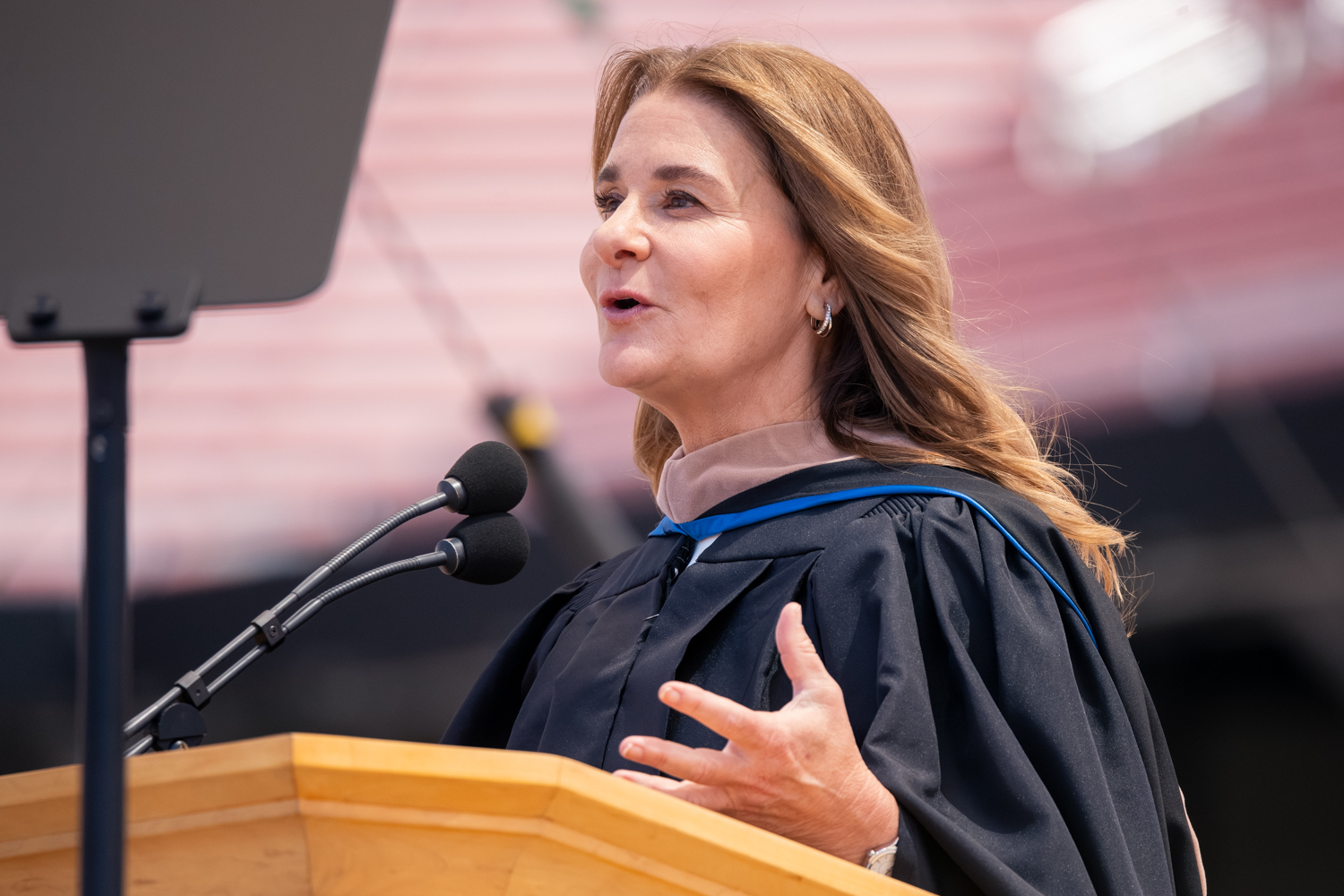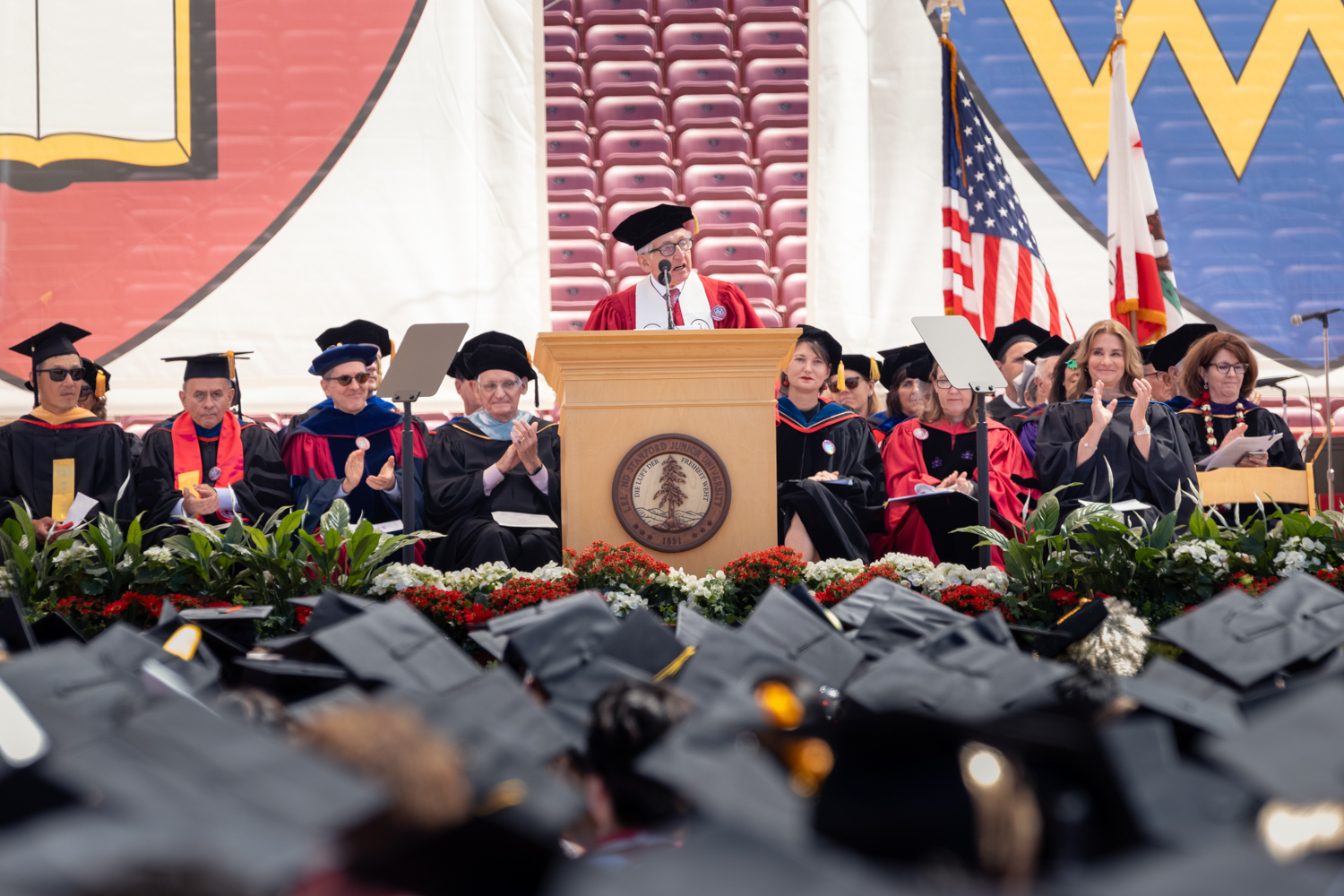Throughout her life, philanthropist and businesswoman Melinda French Gates has navigated difficult transitions, including career changes, having children, and losing a close friend. In each case, she felt terrified that life as she knew it would end.
“I’ve learned that the next day is when the real work begins. Because what we do the next day is what makes us who we are,” she said during her address to the graduating Class of 2024 at Stanford’s 133rd Commencement ceremony on Sunday morning.
French Gates acknowledged the many challenges this year’s graduates have faced, from a once-in-a-century pandemic that changed how they lived and learned to multiple wars that many on campus feel deeply. “There’s no question you are graduating into a different world than the one you matriculated into,” she said. “But you are also leaving this campus prepared to be the leaders we all need.”
An estimated 20,000 people gathered at Stanford Stadium for Sunday’s celebration. Families and friends arrived from across the country and the world to see their graduates receive their Stanford degrees. The ceremony opened with a formal procession, followed by the Wacky Walk student tradition. It included musical performances by the Stanford Jazz Workshop, the Stanford Chamber Chorale, and the Leland Stanford Jr. University Marching Band.
Provost Jenny Martinez presented the Award for the Advancement of the Common Good and the Cuthbertson, Dinkelspiel, and Gores awards.
During the Commencement ceremony, some 240 students participated in a silent walkout supporting Palestinians affected by the Israel-Hamas war.
You are the water
French Gates, a philanthropist, founder of Pivotal, and co-founder of the Gates Foundation, has deep ties to Stanford. Her father, Ray French, earned a master’s degree in mechanical engineering from Stanford in 1962, and her daughters and son-in-law are also alumni. Sunday’s Commencement address was her second at Stanford; her first was in 2014 with Bill Gates.
In her address, French Gates shared a teaching by the spiritual leader Ram Dass about two waves – one big, one small – rapidly approaching the shore. The big wave, devastated that the end is near, insists, “We’re done for.” The smaller wave remains calm and assures the bigger wave they are not, because “You’re not a wave. You’re water.”
“I love that story,” French Gates said. “It captures what it’s like to experience an enormous transition without losing the core of who you are.”
Lessons in transition
French Gates shared three lessons from her own experiences with transitions. First, she advised approaching change with “radical openheartedness.” She encouraged graduates to embrace uncertainty and leave room in their lives for change.
“Resist the idea that anything you’ve done here at Stanford has already locked you into one path or any one kind of life or career,” she said.
She urged them to be excited about new possibilities and open to new paths. “Remember that once the wave learns to call itself by a different name – once it realizes it is not just a wave, but it is water – it becomes free to take on new forms,” she said. “The same is true for you.”

No matter who you are, there will be moments in your journey when you need to be carried, or when someone else will need you to help carry them.”
French Gates called on graduates to find their “small wave” by seeking out the help and wisdom of others, and then to reciprocate. She said that in the stadium there was “someone who can help you imagine yourself as the person you want to become. And just as important, there is someone here who needs you to serve that role for them in return.”
Finally, she urged graduates to cultivate trust. Quoting the late businessman and philanthropist Charlie Munger, she said, “The highest form which civilization can reach is a seamless web of deserved trust – totally reliable people correctly trusting each other.”
While challenging to achieve, French Gates said, such a high aspiration is a worthy goal. “We need each other. No matter who you are, there will be moments in your journey when you need to be carried, or when someone else will need you to help carry them.”
She assured the Class of 2024 that they are ready to confront today’s many global challenges and advised them to remain connected to others. “Yes, you are graduating into a broken world, but it is community that rebuilds things.”

President Richard Saller speaks at Stanford’s 133rd Commencement ceremony. | Andrew Brodhead
The power of gratitude
President Richard Saller, who will leave office at the end of July when he is succeeded by Jonathan Levin, congratulated graduates on all they’ve achieved despite many global challenges. He also urged them to be grateful for their families, for Stanford, and for the people and communities that have supported their success.
“Genuine feelings and expressions of gratitude result in social cohesion and a stronger civil society,” Saller said. “These social bonds are very much needed in the current context of division and polarization.”
While acknowledging the problems the modern world faces, he reminded graduates that humanity has also made great strides in health outcomes, life expectancy, literacy rates, and other metrics. “In the long view of history, these are absolutely stunning changes, and a basic cause of the improvements has been education and the discovery and dissemination of new knowledge to which you and Stanford are making signal contributions,” he said.
He encouraged graduates to be hopeful, however difficult it may be in today’s world. “I am optimistic that your generation will take on the challenges with the knowledge and spirit that you have acquired here at Stanford,” he said. “I wish you every success in that endeavor.”
Remembering Stanford
As per tradition, Sunday’s ceremony included the Wacky Walk, a procession of graduates arriving in “wacky” costumes, including a giant “churro,” a reference to the Hello sculpture on campus.
Stanford senior Julia Wortman was among the Wacky Walk participants. “Everything at Stanford has been such a dream,” said Wortman, who wore a Spiderman costume. “It is just filled with love and friendships.”
Earlier that morning, senior Harper Hummelt met with friends at Tresidder Memorial Union for their last morning coffee as students.
“I’m thinking about how happy I am that all my family is here, and that I get to walk over the stage with all my friends,” Hummelt said. “That’s amazing.”
Hummelt’s friend, senior Tessa Wayne, agreed. “The past four years have meant everything. I was really bummed to be spending the first one at home, and the last three have above and beyond made up for that,” Wayne said. “I wasn’t that familiar with Stanford before I came, and I now can’t fathom a world where I have to leave it.”
Proud parent Angela Peltan reflected on the culmination of her son Egan’s (PhD ’24, Chemical and Systems Biology) academic journey. “A new door is opening for him to go and explore the world on his terms, with the knowledge that he has gained,” Peltan said.
Class of ’24 by the numbers
On Sunday, Stanford awarded 1,838 bachelor’s degrees, 2,575 master’s degrees, and 1,003 doctoral degrees.
Among those who received bachelor’s degrees, 333 graduated with departmental honors, 317 graduated with university distinction, 110 satisfied the requirements of more than one major, 34 graduated with dual bachelor’s degrees, 591 completed minors, and 398 graduated with both a bachelor’s degree and a master’s degree.
Among the undergraduate class, 176 are international students from 80 countries. Among advanced degree holders, 1,301 are international students from 110 countries.